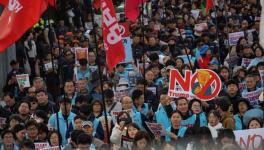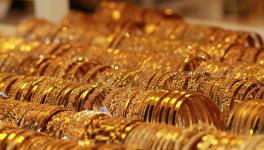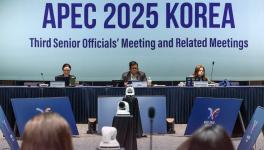Putin’s Dream to Reset the World Order
Russian President Vladimir Putin delivered a speech at Yad Vashem Holocaust memorial center, Jerusalem, January 23, 2020, to mark 75 years since the liberation of Auschwitz
Moscow has a way of signalling to the White House on critical issues from time to time through public statements calibrated to catch President Trump’s attention. It happens usually on Sundays such as on July 11 when the Kremlin spokesman Dmitry Peskov transmitted a complicated signal which pointedly called attention to the growing despondency in Moscow that the Russian-American relationship lies in tatters.
In this backdrop, US State Secretary Mike Pompeo’s phone call to Russian counterpart Sergey Lavrov on Monday does not come as total surprise, where he discussed an idea that President Vladimir Putin had first articulated in a speech at the Fifth Holocaust Forum meeting in Jerusalem on January 23, 2020 — on the imperative need of choreographing a new world order, and the high responsibility of the permanent members of the UN Council to work towards it by holding a summit meeting by September.
Peskov articulated President Putin’s deep anguish over Moscow’s number one concern today in global politics which has profound implications for global balance and stability — namely, renewal of the New START (Strategic Arms Reduction Treaty) with the US, which is due to ‘expire’ in February.
Again, in the weekend, former Russian President Dmitry Medvedev, a top Kremlin official at the moment, told Interfax news agency that Trump’s chance of winning the November presidential election in November “doesn’t look bright.” While doing so, Medvedev also conveyed a complicated message that it may still not be too late to salvage Trump’s political career.
He said, “The American people will decide. Trump has lots of problems, which affects his rating. He is pretty much lagging behind his main rival. Still, he is a creative person and it is quite possible that a miracle, which happened four years ago, might repeat itself. But for now, his chances do not look bright, considering the grave economic situations caused by coronavirus and racial unrest.”
Interestingly, this is more or less the Chinese assessment of US politics, too. Moscow apparently believes in “miracles” and hopes that Trump, “a creative person”, could still repeat the incredible feat in 2016 when he swept past Hillary Clinton. Whereas, Beijing too hasn’t written off Trump. The policy speech by State Councilor and Foreign Minister Wang Yi at the China-US colloquium last week before an audience that included Henry Kissinger contained flashes of an overture to Washington.
The Chinese commentaries have zeroed in on Trump’s mishandling of the Covid-19 pandemic as the genesis of his woes. The argument goes like this: Trump miscalculated that strong measures to check the pandemic might hurt the momentum of the US economy and, therefore, he deliberately played down the virus threat — but only to end up seeing to his dismay the virus spread spiralling out of control and ravaging the economy.
Beijing still thinks it can help Trump to turn the tide of the pandemic with the considerable expertise it has acquired, and bringing to the fore its vaccine research, etc. Trump himself would have realised by now that his Wuhan virus tirade is no longer useful as a campaign plank.
Suffice to say, Pompeo has picked up the phone and dallied Lavrov on Monday at a sensitive moment — no doubt, on Trump’s instructions. The Russian readout couched in a positive tone stressed that the two top diplomats had a “detailed discussion of the preparations for the meeting of the leaders of the five permanent members of the UN Security Council proposed by Russia. They exchanged opinions on providing strategic stability in the context of the forthcoming meetings of the Russian-US working groups on military and political subjects.”
In essence, Trump is revisiting a proposal originally mooted six months ago by Moscow and Paris — with Beijing’s enthusiastic backing — that a summit meeting of the heads of state of the five permanent members of the UN Security Council has become an imperative need, 75 years after the end of World War II, to establish a new peace order that ensures that such a horrific catastrophe will never again visit mankind.
Putin’s far-sighted initiative, spelt out for the first time in the powerful speech at Jerusalem, anticipated the cascading tension in the international system stemming from the combination of the Covid-19 pandemic, the colossal decline of the physical economy, the systemic collapse of the financial system, and a growing geopolitical confrontation among major powers, which is today leading to a breaking point that can degenerate into social chaos and widespread war.
Putin’s initiative reflects conviction that even a multitude of small steps and measures to deal with all the different crises will no more suffice; nothing short of a veritable Grand Design can provide a comprehensive solution. There are several aspects to a Grand Design. For a start, the dramatic crises currently menacing the world call for a new world economic order based on a New Bretton Woods system. An investment program in the tradition of President Franklin Roosevelt’s New Deal could provide a very useful common thread among the P5 heads of state, all of whom have at one time or another referenced FDR in positive terms.
Equally, the agenda should include a Glass-Steagall bank separation; an industrial development plan on a global scale — a New Deal for the entire world; and a credit system — a New Bretton Wood; and most important, a worldwide health system, i.e., a modern health system that could measure up to at least the standard that China demonstrated in Wuhan in fighting the pandemic.
Putin was intensely conscious that a P5 summit will in all likelihood be the last chance to establish a basis of trust for a strategic orientation of international relations among the five major nuclear powers. It is well-known that in a priori history, Trump’s own political instincts were towards having good relations with Russia and China. Without doubt, looking at our planet from above, cooperation between the two largest nuclear powers as well as between the two largest economies in the world is indispensable if mankind is to overcome this pandemic and other impending pandemics, as well as hunger, poverty and underdevelopment.
In Putin’s world view, too, no matter the prevailing gloomy world scenario, the US-Russia-China triangle has good prospects to “come through in a constructive manner” and “form the basis to trace the entire history of international relations,” as highlighted in a highly nuanced Tass interview by the Russian Foreign Ministry spokesperson Maria Zakharova last week in a smart signal to both Washington and Beijing.
The big question is, how far the trans-Atlantic neo-liberal establishment, for whom Trump’s defeat in the November elections is the all-consuming priority, will play along. It is useful to recall that the ‘Wuhan virus’ was first conjured up by the former heads of Britain’s MI6 Secret Intelligence Service, Sir John Sawers and Sir Richard Dearlove, and the London-based Henry Jackson Society which, in a blatant provocation, challenged China to pay $9 trillion in reparations!
This deadly power centre in London also masterminded the ‘Russiagate’ to create a quagmire for the Trump presidency. Fortunately, ‘Russiagate’ met with an ignominious end and the Wuhan-virus conspiracy theory has been rejected as unfounded even by American medical experts. (A WHO delegation is currently in Wuhan to investigate the origins of the virus and the chronology of the pandemic.)
Nonetheless, it is vital that the statesmen from the world’s five major nuclear powers try and lose rather than not to try at all to explore how a completely different program can be scripted for the agenda of international politics in order to prevent the cumulative effects of the pandemic, hunger, economic collapse — and a financial crash — becoming the destiny of mankind.
Get the latest reports & analysis with people's perspective on Protests, movements & deep analytical videos, discussions of the current affairs in your Telegram app. Subscribe to NewsClick's Telegram channel & get Real-Time updates on stories, as they get published on our website.
























